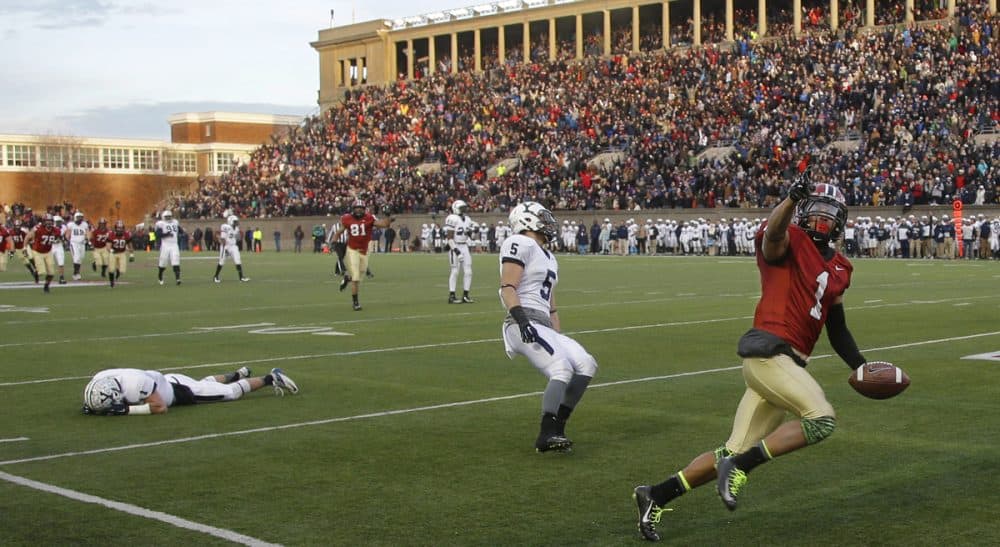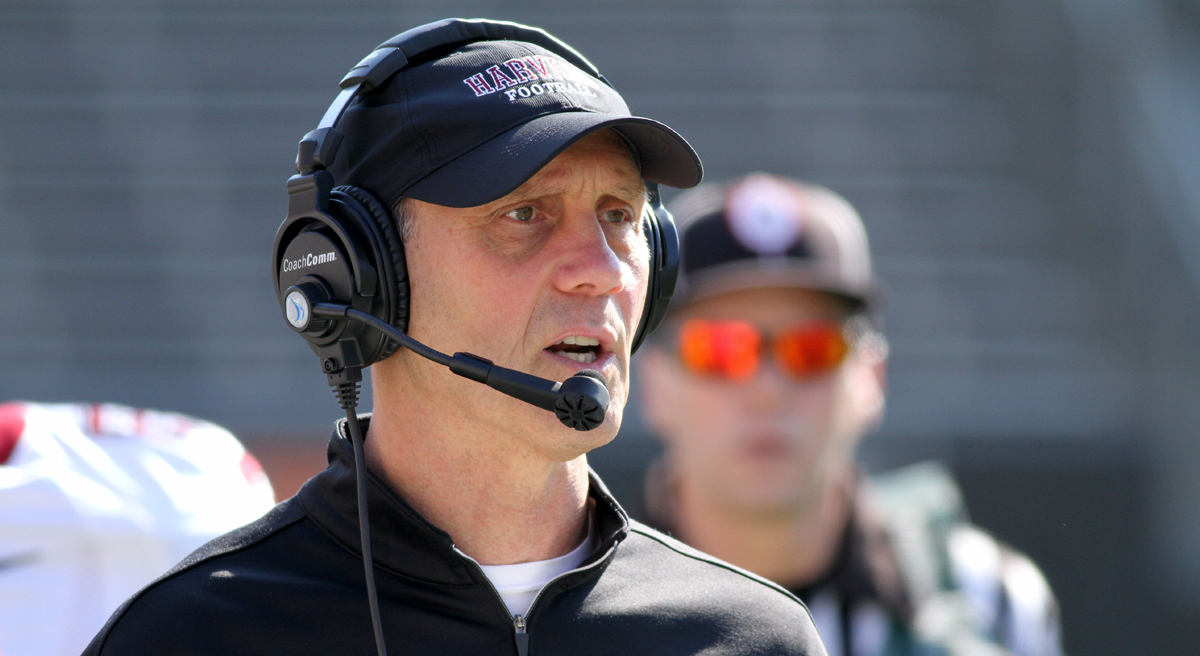Advertisement
Harvard: Undefeated — And Finished For 2014

His football team has won 14 straight games. Only one major college team in the United States — the miscreant-stacked Florida State Seminoles -- has a longer winning streak than Tim Murphy’s Harvard Crimson.
You knew that, right? You also knew Harvard is one of three undefeated major college teams in the country, along with the aforementioned Florida State as well as Marshall. You knew Harvard’s 14-gamer is the longest winning streak in its division, the group of colleges just below the big-timers.
You knew Murphy just completed his third undefeated season in 21 years after Harvard outlasted Yale on Saturday, 31-24, in the 131st edition of The Game.
The FCS playoffs start this weekend and Harvard is the only team in the top 15 not in the tournament.
Murphy is on a roll. It has been eight years since Harvard has lost consecutive games. Since 2001, the Crimson has the nation’s best record in the FCS (Football Championship Subdivision), going 114-25. That also is tied for second in all of Division I. Murphy has guided the Crimson to 13 straight seasons of at least seven victories, also an Ivy League record.
The Crimson finished the 2014 season at 10-0, ranked No. 14 in the FCS Coaches' Poll and now gets ready for the NCAA playoffs, along with 23 other teams. Right?
Actually, no.
The Ivy League allows its teams to compete for NCAA titles in virtually every competitive sport -- except football. Yale won the men’s Division I NCAA hockey championship in 2013. Since 1956, when the Ivy League started play, its eight member institutions have combined to win 46 NCAA team championships and 197 NCAA individual/event championships through last season.
But football? No way. Sorry Harvard. The longstanding reason has been that the student athletes (which is not an oxymoron at a place like Harvard) must take this time to focus on their exams. I guess that means that the 24 teams who are in the FCS playoffs, including top-seeded University of New Hampshire, Villanova, Fordham and James Madison, allow their kids to skip the exam period and just focus on football until their team is eliminated.
Not so, said Mike Murphy (no relation to Tim), head of athletic communications at UNH, in a telephone interview this week. "Our kids are in class all week, doing papers and getting ready for exams. That goes on throughout the playoffs and they seem to be able to handle it."
This being 2014, you would think the Ivy League poobahs would descend from their respective towers of ivory and allow the football champion to compete for a national title. Yes, Coach Murphy says he views the regular-season finale against Yale as Harvard’s real playoff game. But what else is he supposed to say?

In an email this week, Scottie Rodgers, a spokesman for Ivy League athletics, wrote: “The Ivy League presidents are not interested in allowing participation the NCAA Division I Football Championship because of its potential impact on academics with a schedule that extends into December and early January. They believe the focus should be on the regular season in football and that the traditions and the history of Ivy League football should be paramount.”
This stance is as outdated as the raccoon coat. Players can take exams any number of ways that doesn’t require them to sit in a proctored classroom with a ticking clock and a blue book. They show during the season that they can balance the rigors of the classroom with the rigors of the gridiron. What’s to say they can’t do the same studying for and taking exams?
You’d like to think that those Ivy League presidents would want to give their football team a chance to compete for a national championship. Harvard, for goodness sakes, touts its seven national championships by hanging banners in its stadium. There’s another banner commemorating a Rose Bowl appearance adorning a window in an athletic building.
OK, so the national championships were between 1890 and 1919 and the Rose Bowl was in 1920. There were no playoffs back then and big-time college football was pretty much consigned to the Northeast, Army and Navy.
Not anymore.
[The Ivy League's] stance is as outdated as the raccoon coat.
The New York Times recently ran a story with an accompanying map, on where Division I college football really matters. The entire New England area was ranked as an area where it mattered the least. No surprise there.
Tim Murphy could walk down any street in Boston and go completely unrecognized. Yet he’s arguably one of the handful of most successful coaches in the country.
The FCS playoffs start this weekend and Harvard is the only team in the top 15 not in the tournament. The championship game is Jan. 10 in Frisco, Texas. The champion and runner-up could end up playing an additional five games beyond their 11- or 12-game regular season. That’s a lot of games.
The movers and shakers in the Big Sky Conference, Big South Conference, Colonial Athletic Association, Mid-Eastern Athletic Conference, Missouri Valley Conference, Northeast Conference, Ohio Valley Conference, Patriot League, Pioneer League, Southern Conference and Southland Conference have all decided their football players are up to the task.
But it’s too many, apparently, for those fragile flowers of the Ivy League.
Related:
